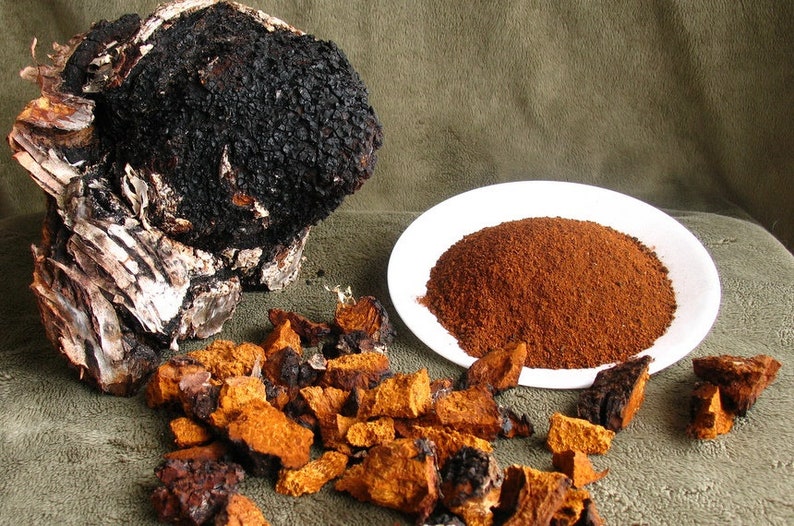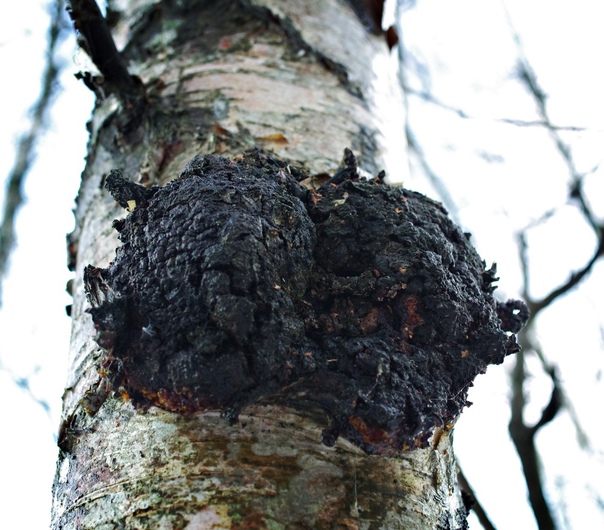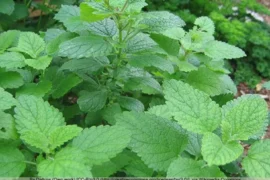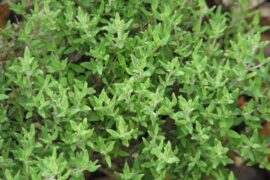Table of Contents
ToggleOverview
Chaga mushroom (Inonotus obliquus) is a type of fungus that grows primarily on birch trees found in colder climates, such as Siberia, parts of Northern Europe, and North America. This hardy mushroom recognized for its unique look and powerful health benefits, has been utilized for centuries in traditional medicine, particularly in Russia and other parts of Eastern Europe, where it was valued for its immune-boosting and anti-aging properties.
Currently, Chaga is regarded as one of the most powerful superfoods, often referred to as the “King of Mushrooms.” In this article, we will explore why people around the world are turning to this ancient treatment for health and how you can integrate it into your daily life.
What Is Chaga Mushroom?
Chaga is a parasitic fungus that grows on the bark of birch trees, appearing as a dark, hard mass that resembles burnt charcoal. It flourishes in harsh environments, absorbing nutrients from its host trees. Over time, the absorbed nutrients coalesce to form a rich concentration of antioxidants, vitamins, and minerals.
These nutrients and bioactive compounds contribute to its remarkable health benefits despite its growth in unexpected places. Unlike other mushrooms, Chaga is not typically eaten in its raw form. Instead, it is dried and ground into a powder, or brewed in hot water to create a therapeutic tea.
The recent popularity of Chaga mushroom in modern health and wellness circles is primarily due to its high levels of antioxidants, as well as its potential to support immune health, fight inflammation, and promote overall vitality.
The Health Benefits of Chaga Mushroom
Chaga is often called the “king of medicinal mushrooms,” and for a good reason. Here are some researched potential benefits of this mushroom:
1. Rich in Antioxidants
Chaga is one of the richest sources of antioxidants found in nature, particularly melanin and superoxide dismutase (SOD). These antioxidants help neutralize free radicals in the body, which are unstable molecules that can damage cells and contribute to aging and disease. A 2004 study shows that chaga mushroom extract can benefit human lymphocytes by inhibiting oxidative DNA damage. By combating oxidative stress, Chaga may help protect the body from a variety of chronic conditions, including cancer, heart disease, and premature aging.
2. Immune System Support
Chaga is widely recognized for its ability to improve immune function. It contains compounds like beta-glucans that can enhance the activity of white blood cells, fortifying the body’s defenses against harmful microorganisms. Some studies conducted on mice suggest that Chaga may also aid the immune system through the regulation of cytokines, making it beneficial for both boosting immunity during illness and moderating autoimmune responses.
3. Anti-Inflammatory Effects
Inflammation is often at the core of many chronic diseases, including arthritis, heart disease, and certain types of cancer. Chaga mushroom has powerful anti-inflammatory properties that can help reduce inflammation in the body, potentially easing symptoms associated with conditions like rheumatoid arthritis and other inflammatory disorders. Research involving zebrafish demonstrates that chaga mushroom exhibits anti- inflammatory effects and may be a safer alternative to conventional chemotherapy.
4. Supports Digestive Health
Chaga can support a healthy digestive system. It may assist in regulating stomach acid production, safeguarding the gut lining, and promoting healthy gut microbiome. This can be beneficial for individuals experiencing digestive issues such as bloating, indigestion, or irritable bowel syndrome (IBS). Research indicates that oral consumption of chaga extract could be beneficial in the treating inflammatory bowel disease (IBD).
5. Boosts Energy and Mental Clarity
Besides its advantages for physical health, Chaga possesses adaptogenic properties, meaning it can help the body manage stress effectively and improve overall mental clarity. While further research may be necessary to fully understand its adaptogenic effects, chaga is rich in antioxidants, particularly, melanin, polysaccharides, and triterpenes, all of which may aid in combating fatigue, improving focus, and fostering a more balanced mood, making it an excellent complement to your daily wellness practises. Other adaptogenic herbs include reishi mushroom, ashwagandha, cordyceps, and eleuthero.
6. Blood Sugar Regulation
Some studies have shown that Chaga may help regulate blood sugar levels and boost glucose tolerance which is particularly beneficial for those with diabetes or insulin resistance. By improving insulin sensitivity and lowering blood sugar spikes, Chaga may help support metabolic health and lower the risk of developing type 2 diabetes.
7. Skin Health and Anti-Aging
Due to its high antioxidant levels, Chaga is frequently included in skincare products aimed at reducing the visible signs of aging. The melanin present in Chaga helps protect the skin from sun damage, and the anti-inflammatory compounds may reduce signs of irritation or inflammation. Many individuals utilize Chaga both internally or topically to support healthy, glowing skin and reduce wrinkles.

How to Consume Chaga Mushroom
Chaga is not typically consumed raw, as it has a very hard, woody texture. Instead, there are several ways to prepare and consume this powerful mushroom:
- Chaga Tea: One of the most popular methods of consumption, Chaga tea is made by simmering dried Chaga pieces or Chaga powder in hot water. This tea can be enjoyed throughout the day for immune support and general wellness.
- Chaga Supplements: Chaga is available in capsule or tincture form, which makes it easy to add to your daily routine without the need for brewing tea.
- Chaga Extracts: Liquid Chaga extracts can be added to smoothies or other beverages for an easy way to reap the benefits of this mushroom.
- Chaga in Skin Care: Some beauty brands now incorporate Chaga mushroom into their products due to its antioxidant and anti-inflammatory properties.
- When trying chaga for the first time, begin with small quantities. This allows your body to acclimate and helps you assess its effects.
Potential Side Effects and Considerations
While Chaga is generally regarded as safe for most individuals, it may not be appropriate for everyone. Here are some considerations to keep in mind:
- Medication Interactions: The potent bioactive compounds in Chaga can react with certain medications, particularly blood thinners. Consult your doctor before use.
- Autoimmune Conditions: Given its immune-boosting properties, individuals with autoimmune diseases like rheumatoid arthritis or lupus should consult a healthcare provider before use.
- Allergies: Individuals who are allergic to mushrooms should avoid chaga.
- Pregnancy and Breastfeeding: Pregnant or nursing women should refrain from using Chaga unless specifically advised by a healthcare professional.
As with any supplement, moderation is important. Excessive consumption can have adverse effects.
Conclusion
In a landscape dominated by synthetic supplements, chaga offers a natural alternative. From supporting immune function and reducing inflammation to boosting energy and promoting healthy skin, Chaga displays nature’s ability to provide solutions in the most unexpected forms. Regardless of how you may wish to consume it, Chaga is a natural remedy worth considering for anyone looking to improve their overall health and well-being.
As with any supplement, it is always a good idea to consult with a healthcare provider before adding Chaga to your routine, especially if you have any existing health conditions or are on medication. With appropriate guidance, Chaga could be the natural boost your body needs to flourish. However, remember that while this mushroom holds promise, it is not a substitute for medical treatment.
Frequently asked Questions on Chaga Mushroom
- How can I choose a quality Chaga product?
To ensure you are getting a high-quality product, consider the following:
Sourcing: Look for Chaga that has been sustainably harvested, preferably from wild trees in cooler climates.
Purity: Confirm that the product contains no additives, fillers, or contaminants.
Form: Decide whether you prefer whole chunks, powder, or extract. Organic and certified products are often safer options.
- Where can I buy Chaga?
Chaga is available at:
- Health food stores
- Online marketplaces
- Specialty herbal shops
Always verify reputable sources and quality certifications to ensure the product is genuine and free from impurities.
- Can Chaga assist with weight loss?
While there is no direct evidence linking chaga to weight loss, its antioxidant and anti-inflammatory properties may support overall health. which might indirectly aid in weight management. Furthermore, its ability to regulate blood sugar may help in controlling cravings and improving metabolic function.
- How do I make Chaga tea?
To make Chaga tea:
- Break the Chaga into small pieces or use Chaga powder.
- Boil water and then add the Chaga chunks (approximately one teaspoon per cup).
- Simmer on low heat for 30-60 minutes.
- Strain and enjoy. Feel free to add honey, lemon, and other flavors if desired. The tea can be stored it in refrigerator for several days.
- How long should Chaga be consumed for maximum benefits?
There is no defined duration for consuming Chaga, as its benefits vary among individuals. It can be used as a long-term supplement, but it is important to take breaks, such as a few weeks off after several months of use, to prevent any potential buildup of compounds in the body.
- Is Chaga sustainable?
Chaga grows slowly and is often collected from wild birch trees. Overharvesting can jeopardize its sustainability. Look for ethically sourced Chaga to encourage responsible harvesting practices.
- Is it possible to cultivate Chaga at home?
Growing Chaga at home is challenging because it requires specific conditions and a host tree (birch). Most individuals opt to purchase it from trusted suppliers instead.





